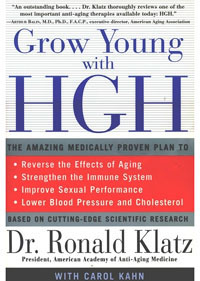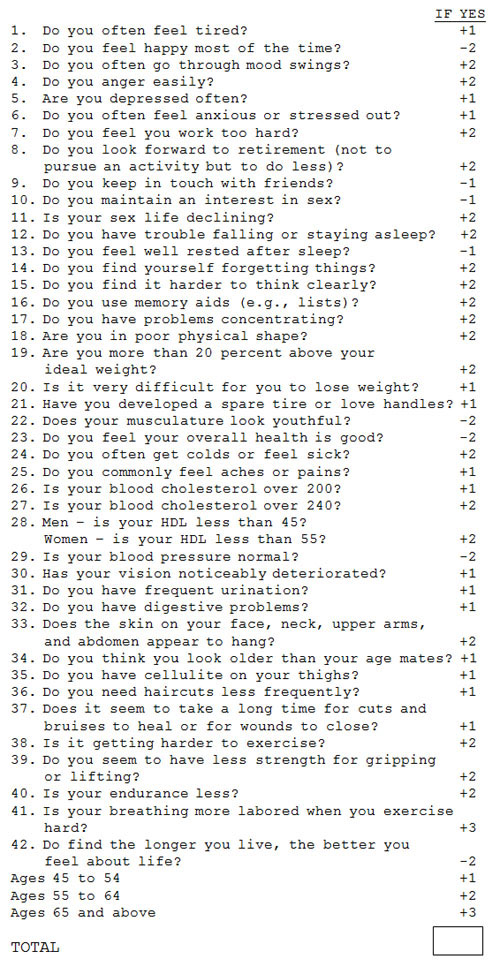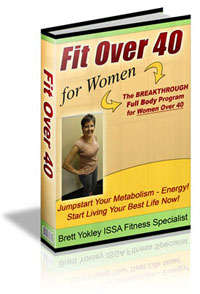Growth hormone deficiency mimics the effects of aging. It is associated with a general sense that you are going downhill. This self test gives you an estimate of whether you might be deficient and, if so, to what extent. Depending on your results, you may be able to reverse this downward trend naturally.
 The landmark book, Grow Young with HGH, by Dr. Ronald Klatz and Carol Kahn, provides wonderful detail on the importance of replacement therapy for those who have low plasma levels of growth hormone (GH). Dr. Klatz advocates either injection therapy or boosting native levels naturally using a growth hormone supplement and diet program. Regardless of whether you choose one or the other strategy, it is important to know your GH level before you begin. (His site is Dr. Ronald Klatz.)
The landmark book, Grow Young with HGH, by Dr. Ronald Klatz and Carol Kahn, provides wonderful detail on the importance of replacement therapy for those who have low plasma levels of growth hormone (GH). Dr. Klatz advocates either injection therapy or boosting native levels naturally using a growth hormone supplement and diet program. Regardless of whether you choose one or the other strategy, it is important to know your GH level before you begin. (His site is Dr. Ronald Klatz.)
Lab Testing
Of course, you can ask your doctor to order a lab test for IGF-1, the growth factor that indicates your GH level. Indeed, once you take the self test here, you may wish to confirm your results or to get a more accurate picture of where you are by following up with a lab test. Ultimately a lab test should provide the most accurate result.
Self Testing
The self test here is a questionnaire taken from Dr. Klatz’s book, pp. 157-158. The goal of this questionnaire is simply to give you some good ideas of how a less than optimal GH level can show up. Basically, the main growth hormone deficiency symptoms are less energy and vitality, a feeling that life is less exciting, and a decline in libido and sexual performance. Symptoms also typically include mood swings, anxiety, depression, and increased social isolation. The most prevalent physical signs are increased body fat, decreased muscle mass, and thin, wrinkled, or prematurely aged skin.
Answer the Following as Compared to 10 Years Ago. Add or Subtract Points As Indicated

Interpreting the Results
Once you have your total in the box on the right, here is what Dr. Klatz suggests:
14 and below: You are doing well and are within normal range for daily living.
15-22: You may benefit from growth hormone boosting.
23-30: Get your levels of IGF-1 checked and get started on a growth hormone enhancement program (diet, exercise, supplements; HGH injections if you can afford them).
31 and above: Chances are that your growth hormone levels are severely deficient. See an anti-aging physician immediately.
Personal Results: An Example
In scoring myself, I found a very pleasant surprise. My score turned out to be a 4. Wow! I’m not sure, however, whether the psychological aspects of my score are reflective of my GH levels, since I have always had a great attitude about life. In my mind it does, indeed, get better all the time.
My physical health has also been excellent since I was very young, playing sports all year long. I now know quite a bit more about fitness, which means that I know how to exercise very efficiently in my running and weightlifting programs. And I know exactly which supplements are best for me at my age (coming up on 63 this month!), especially those that keep my GH level optimal and that counteract any exercise-induced inflammation that I inflict on myself.
This is the kind of information that will help you, too, no matter where you are in your results from this questionnaire.
More to come!
By the way…
The best books that I know of for showing you how to stay fit with quick, simple, at-home workouts are the Lightning Speed Fitness Program by Roger Haeske and the Fit Over 40 for Women by Brett Yokley. Roger and Brett also throw in lots of bonus books on diet, exercise, and lifestyle when you purchase their books. Click on images below for details.


.
.
.
.
.
.
.
.
.
.
.
.
.
.
.
.
.
.
.
All the best in natural health,
Dr. D
